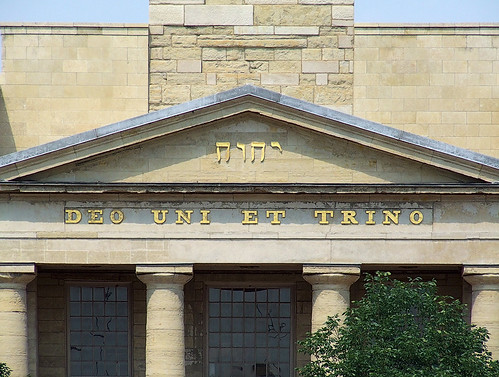
Tetragrammaton, on the pediment of the Basilica of Saint Louis, King of France (the Old Cathedral), in downtown Saint Louis, Missouri. Photo taken in August of last year.
FAITHFUL JEWS will not speak the name of the Lord — יהוה in the Hebrew alphabet, (called the tetragrammaton, transliterated as YHWH in English) — for fear of taking the Lord's name in vain. And so it was also in Christianity, where translations of the tetragrammaton universally substituted 'The LORD" or equivalent.
FAITHFUL JEWS will not speak the name of the Lord — יהוה in the Hebrew alphabet, (called the tetragrammaton, transliterated as YHWH in English) — for fear of taking the Lord's name in vain. And so it was also in Christianity, where translations of the tetragrammaton universally substituted 'The LORD" or equivalent.
But modern translations of the Bible do speak what was once unspeakable — ineffable — and this found its way into the liturgy. This is considered novel, offensive to some, and is harmful to the faith by removing a level of meaning from the language, and risks lowering the Faith to the level of the pagans.
Now, from the Vatican's Congregation for Divine Worship and the Discipline of the Sacraments comes the following directives (facsimile of the original here):
1. In liturgical celebrations, in songs and prayers the name of God in the form of the tetragrammaton YHWH is neither to be used or pronounced.
2. For the translation of the Biblical text in modern languages, destined for liturgical usage of the Church, what is already prescribed by n. 41 of the Instruction Liturgiam authenticam is to be followed; that is, the divine tetragrammaton is to be rendered by the equivalent of Adonai/Kyrios: "Lord", "Signore", "Seigneur", "Herr", "Señor", etc.
3. In translating, in the liturgical context, texts in which are present, one after the other, either the Hebrew term Adonai or the tetragrammaton YHWH, Adonai is to be translated "Lord" and the form "God" is to be used for the tetragrammaton YHWH, similar to what happens in the Greek translation of the Septuagint and in the Latin translation of the Vulgate.


No comments:
Post a Comment